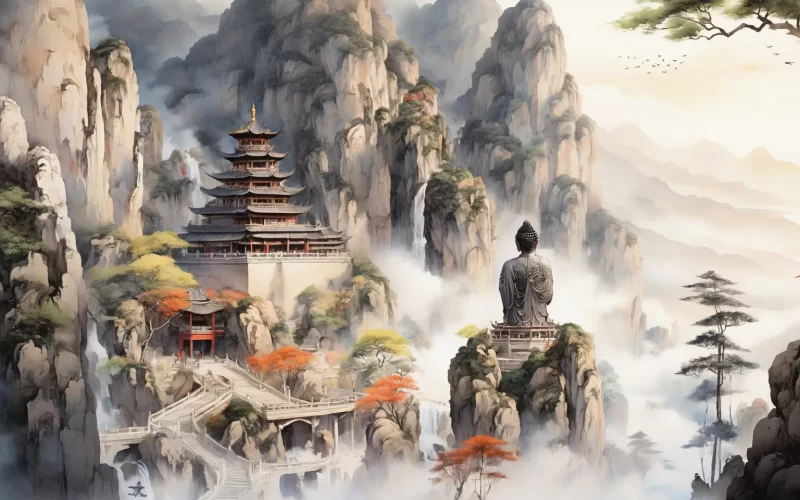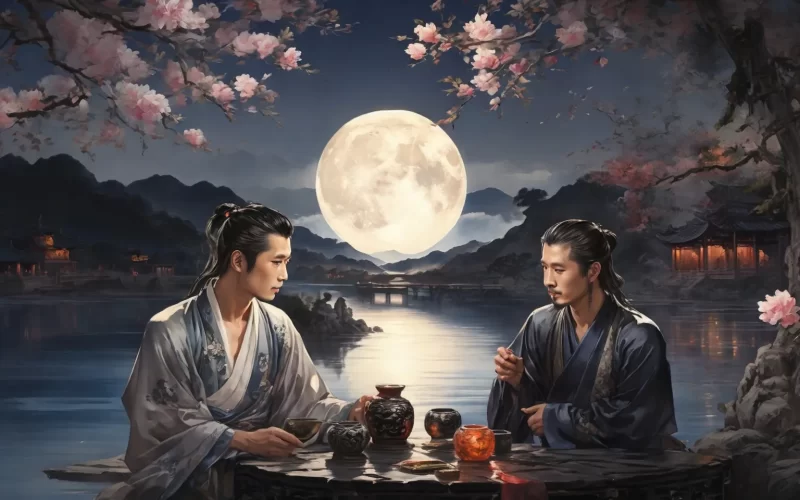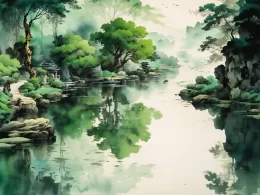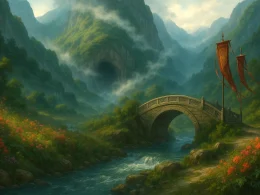Rough were the mountain-stones, and the path very narrow;
And when I reached the temple, bats were in the dusk.
I climbed to the hall, sat on the steps, and drank the rain-washed air
Among the round gardenia-pods and huge banana-leaves.
On the old wall, said the priest, were Buddhas finely painted,
And he brought a light and showed me, and I called them wonderful.
He spread the bed, dusted the mats, and made my supper ready,
And, though the food was coarse, it satisfied my hunger.
At midnight, while I lay there not hearing even an insect,
The mountain moon with her pure light entered my door…
At dawn I left the mountain and, alone, lost my way:
In and out, up and down, while a heavy mist
Made brook and mountain green and purple, brightening everything.
l am passing sometimes pines and oaks, which ten men could not girdle,
I am treading pebbles barefoot in swift-running water -
Its ripples purify my ear, while a soft wind blows my garments…
These are the things which, in themselves, make life happy.
Why should we be hemmed about and hampered with people?
0 chosen pupils, far behind me in my own country,
What if I spent my old age here and never went back home?
Original Poem
「山石」
韩愈
山石荦确行径微, 黄昏到寺蝙蝠飞。
升堂坐阶新雨足, 芭蕉叶大栀子肥。
僧言古壁佛画好, 以火来照所见稀。
铺床拂席置羹饭, 疏粝亦足饱我饥。
夜深静卧百虫绝, 清月出岭光入扉。
天明独去无道路, 出入高下穷烟霏。
山红涧碧纷烂漫, 时见松枥皆十围。
当流赤足蹋涧石, 水声激激风吹衣。
人生如此自可乐, 岂必局束为人鞿?
嗟哉吾党二三子, 安得至老不更归?
Interpretation
This poem was composed in the 17th year of the Zhenyuan era of Emperor Dezong of Tang (801 AD), during Han Yu's journey from Xuzhou to Luoyang. While staying overnight at Huilin Temple, located north of Luoyang, the poet expressed his love for nature and his longing for a free and leisurely life, while also revealing his frustration and resentment toward the hardships of his political career.
First Couplet: “山石荦确行径微 黄昏到寺蝙蝠飞。”
Shān shí luò què xíng jìng wēi huáng hūn dào sì biān fú fēi.
The rugged mountain path is narrow and treacherous; at dusk, I arrive at the temple as bats flutter in the air.
The opening couplet depicts the hardships of the poet's journey. The rugged rocks and narrow path emphasize the difficulty of the mountain trail, while "arriving at dusk" indicates the time of day, hinting at the exhaustion of travel. The bats symbolize the deepening twilight and add to the sense of desolation and quiet.
Second Couplet: “升堂坐阶新雨足 芭蕉叶大栀子肥。”
Shēng táng zuò jiē xīn yǔ zú bā jiāo yè dà zhī zǐ féi.
I step into the temple hall and sit on the steps, feeling the freshness after the rain; the banana leaves are large, and the gardenias are lush and full.
The poet uses "stepping into the hall" and "sitting on the steps" to show his relaxation, creating a peaceful and comfortable atmosphere. The banana leaves and gardenias, described as "large" and "lush," reflect the vibrant vitality after the rain.
Third Couplet: “僧言古壁佛画好 以火来照所见稀。”
Sēng yán gǔ bì fó huà hǎo yǐ huǒ lái zhào suǒ jiàn xī.
The monk says the ancient wall paintings of Buddha are exquisite; by torchlight, the faintly visible images appear even more mysterious.
The poet uses the "ancient wall paintings" to highlight the temple's cultural atmosphere. The faintly visible images under the torchlight add a sense of mystery, enhancing the unique ambiance of the nighttime visit.
Fourth Couplet: “铺床拂席置羹饭 疏粝亦足饱我饥。”
Pū chuáng fú xí zhì gēng fàn shū lì yì zú bǎo wǒ jī.
The monk prepares the bed and serves a simple meal; though the food is plain, it satisfies my hunger.
The poet's contentment with the "simple meal" reflects his gratitude for basic comforts after the hardships of travel, showcasing his humble and peaceful state of mind.
Fifth Couplet: “夜深静卧百虫绝 清月出岭光入扉。”
Yè shēn jìng wò bǎi chóng jué qīng yuè chū lǐng guāng rù fēi.
Late at night, I lie quietly in the temple, all sounds of insects gone; the clear moonlight shines through the window.
The poet uses "all sounds of insects gone" to depict the tranquility of the night, while "the clear moonlight" paints a serene and beautiful scene, capturing the peace and comfort of his stay.
Sixth Couplet: “天明独去无道路 出入高下穷烟霏。”
Tiān míng dú qù wú dào lù chū rù gāo xià qióng yān fēi.
At dawn, I set off alone, with no clear path; I traverse the undulating mountain trails, enveloped in morning mist.
The poet uses "no clear path" to emphasize the ruggedness of the mountain trail, while "enveloped in morning mist" creates a hazy and mysterious atmosphere, capturing the depth and beauty of the morning mountains.
Seventh Couplet: “山红涧碧纷烂漫 时见松枥皆十围。”
Shān hóng jiàn bì fēn làn màn shí jiàn sōng lì jiē shí wéi.
The red mountain flowers and green streams dazzle in their brilliance; occasionally, I see pines and oaks, each ten spans thick.
The poet uses vibrant colors to depict the lively scenery under the morning light, showcasing the vitality of nature. The thickness of the pines and oaks adds to the ancient and mysterious aura of the mountains.
Eighth Couplet: “当流赤足蹋涧石 水声激激风吹衣。”
Dāng liú chì zú tà jiàn shí shuǐ shēng jī jī fēng chuī yī.
At the stream, I take off my shoes and step barefoot on the rocks; the water rushes loudly, and the mountain breeze blows through my clothes.
The poet's "barefoot" steps reflect his joy in returning to nature and relaxing his body and mind. The sound of the rushing water and the breeze through his clothes capture the refreshing and dynamic beauty of nature.
Ninth Couplet: “人生如此自可乐 岂必局束为人鞿?”
Rén shēng rú cǐ zì kě lè qǐ bì jú shù wéi rén jī?
If life could be like this, it would naturally be joyful; why must we be bound by worldly constraints and live without freedom?
The poet elevates the joy of his journey to a philosophical reflection, expressing his love for a free life and his dissatisfaction with the constraints of officialdom.
Tenth Couplet: “嗟哉吾党二三子 安得至老不更归?”
Jiē zāi wú dǎng èr sān zǐ ān dé zhì lǎo bù gēng guī?
Alas, my few companions, how can you grow old without returning to nature?
The poet sighs with "alas," lamenting the difficulties of his political career and urging his companions to cherish nature and freedom, advocating for a return to a simple life.
Overall Appreciation
The poem captures the poet's love for nature and his longing for a free and leisurely life through the sights, sounds, and feelings of his journey. The first half describes his overnight stay at Huilin Temple, depicting the serene beauty of the mountain temple and his contentment amidst the exhaustion of travel. The second half portrays the natural beauty encountered during his morning journey, reflecting his joyful and optimistic state of mind. The poem concludes with a lament about the hardships of officialdom and a call for a return to nature and freedom.
Writing Characteristics
- Scene and Emotion Intertwined, Profound Imagery: The poet seamlessly blends his emotions with the natural scenery, vividly conveying the tranquility of his overnight stay, the joy of his morning journey, and his longing for freedom.
- Vivid Descriptions, Dynamic Touch: Phrases like "the clear moonlight shines through the window" and "barefoot steps on the rocks" bring the scenes to life, capturing the dynamic beauty of the mountains.
- Simple Language, Genuine Emotion: The poet uses plain and natural language to express his desire for freedom and his weariness of official constraints, creating a heartfelt and moving work.
Insights
This poem reminds us that life's journey is not only filled with hardships but also moments of tranquility and peace. Faced with the difficulties of his political career and life's troubles, the poet does not succumb to negativity but instead finds solace and release in nature. The scene of "barefoot steps on the rocks, the water rushes loudly, and the mountain breeze blows through my clothes" not only reflects his closeness to nature but also embodies a return to simplicity and freedom. Through this poem, the poet encourages us not to be overly attached to worldly fame and achievements. Instead, by slowing down and embracing nature, we can find true joy and peace in life.












